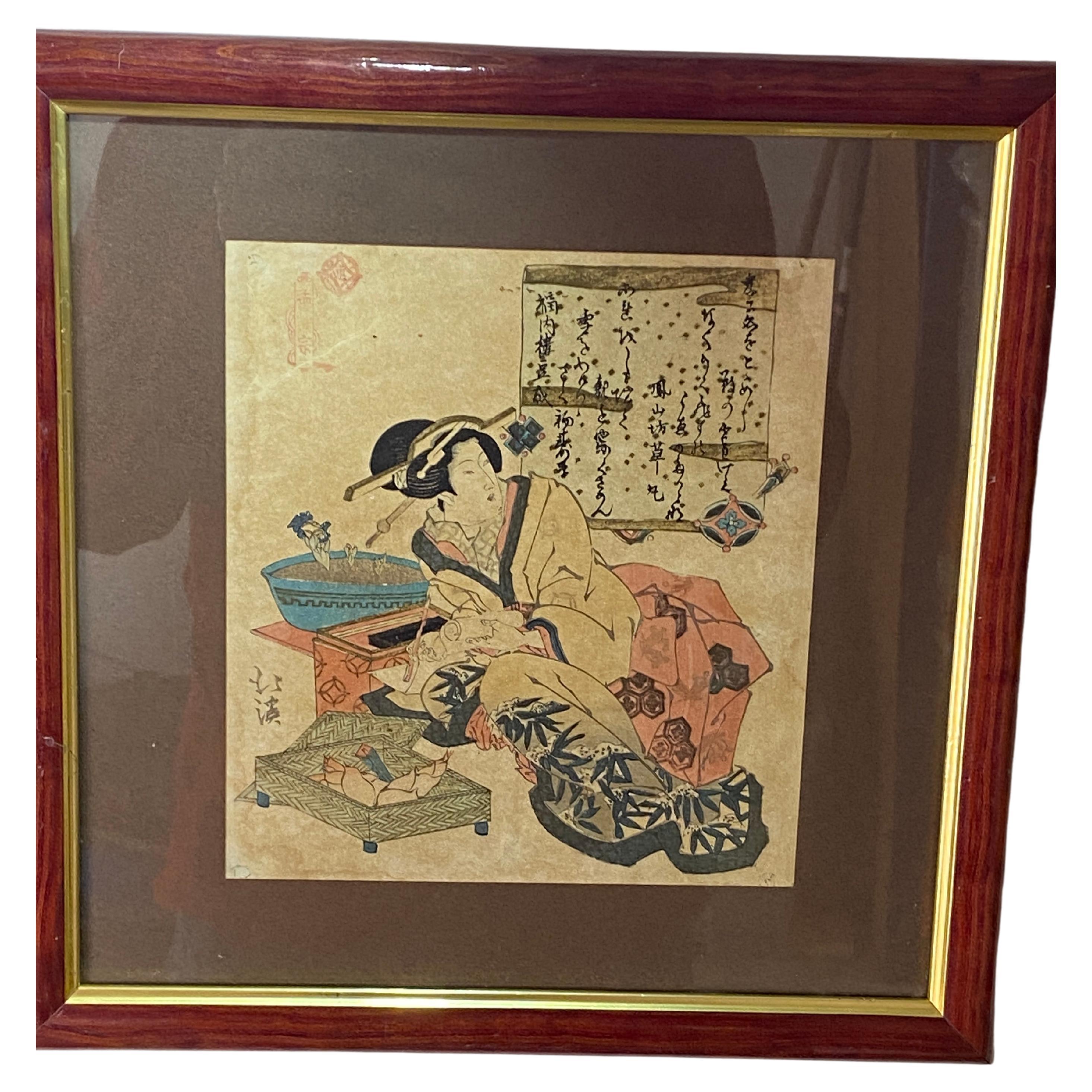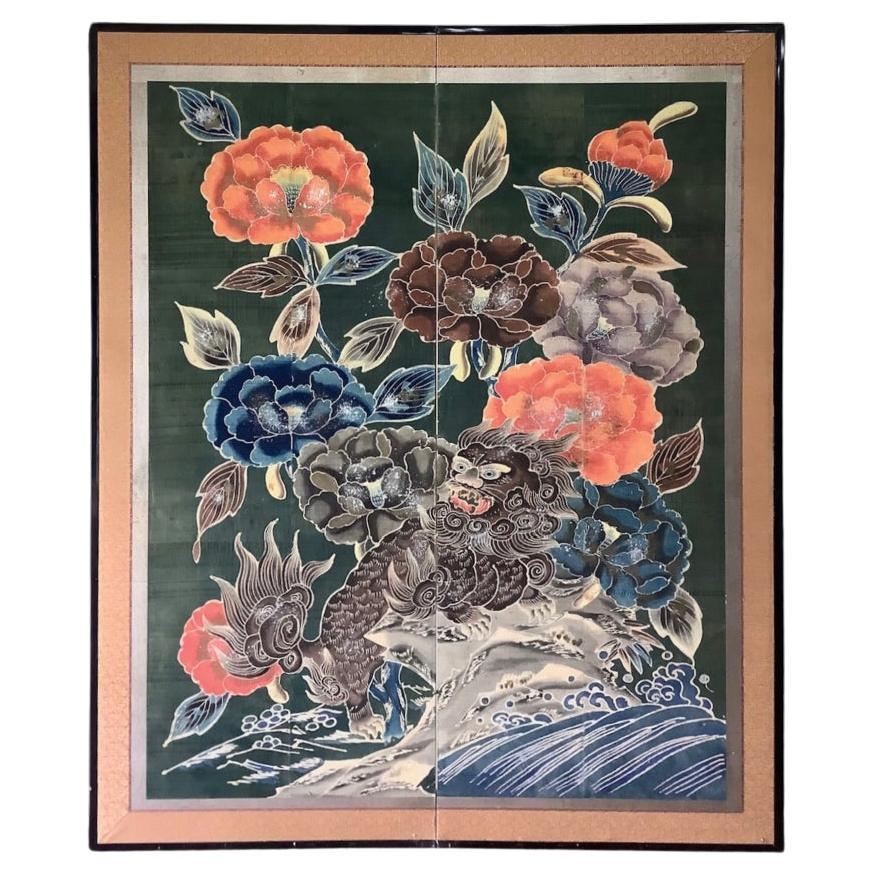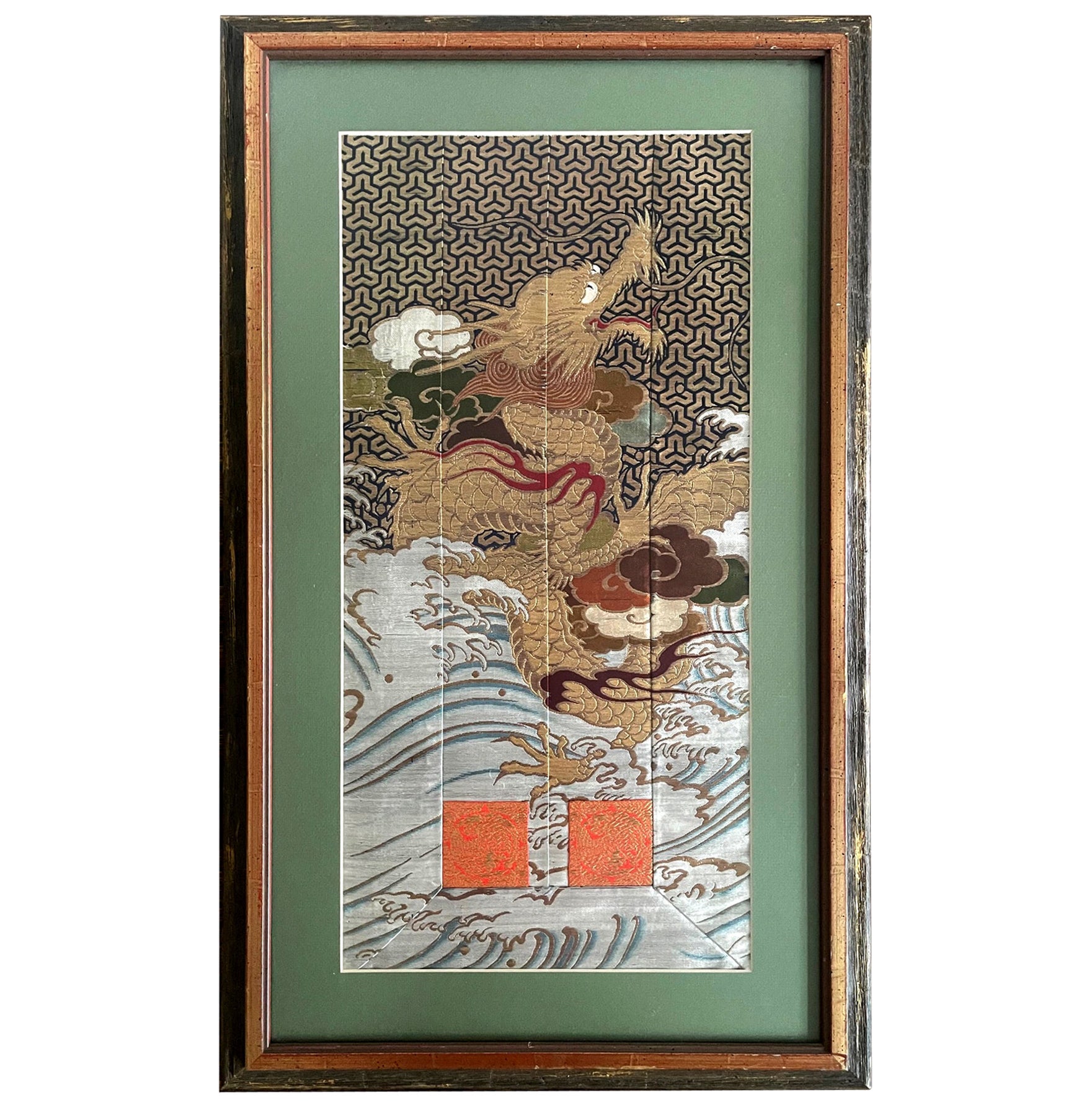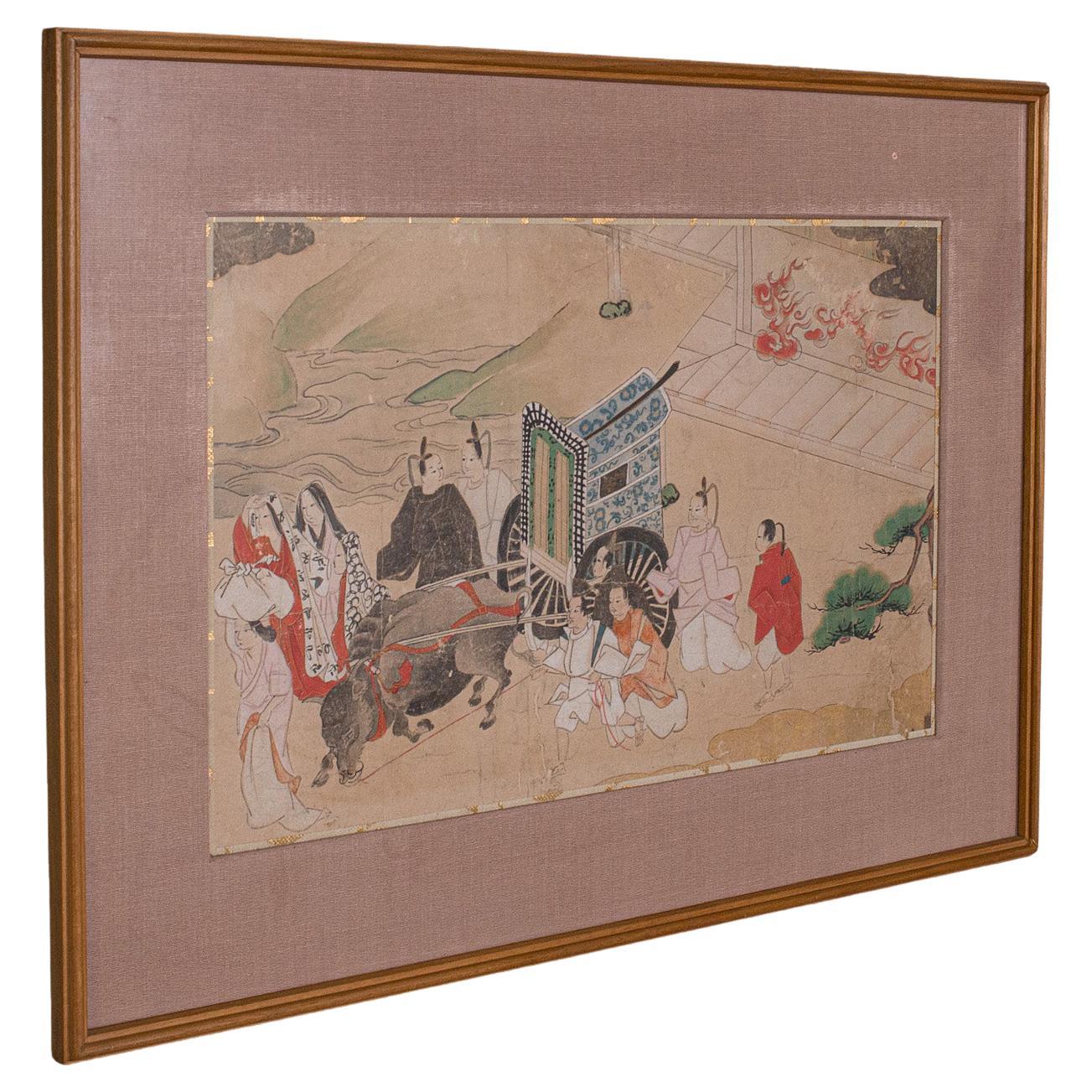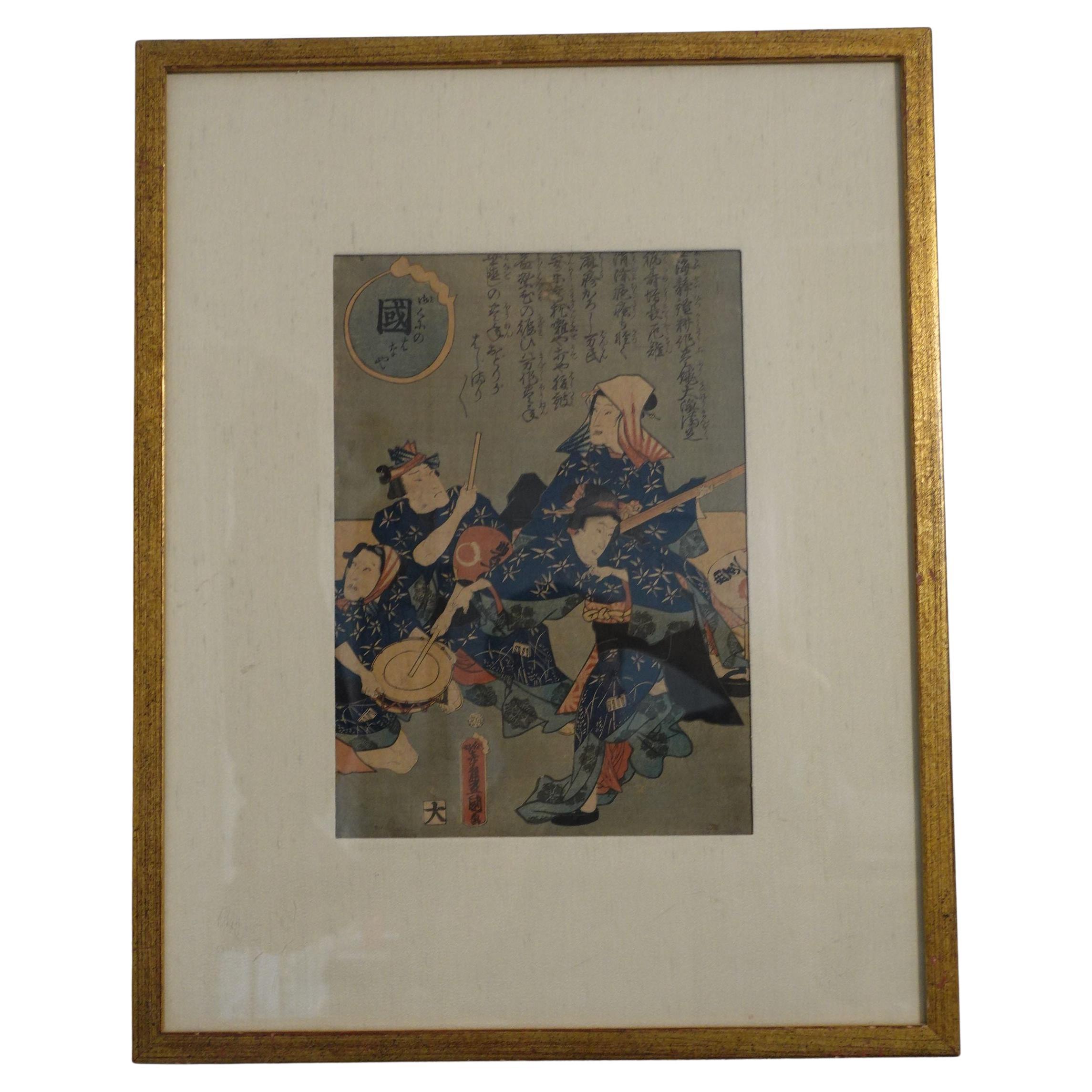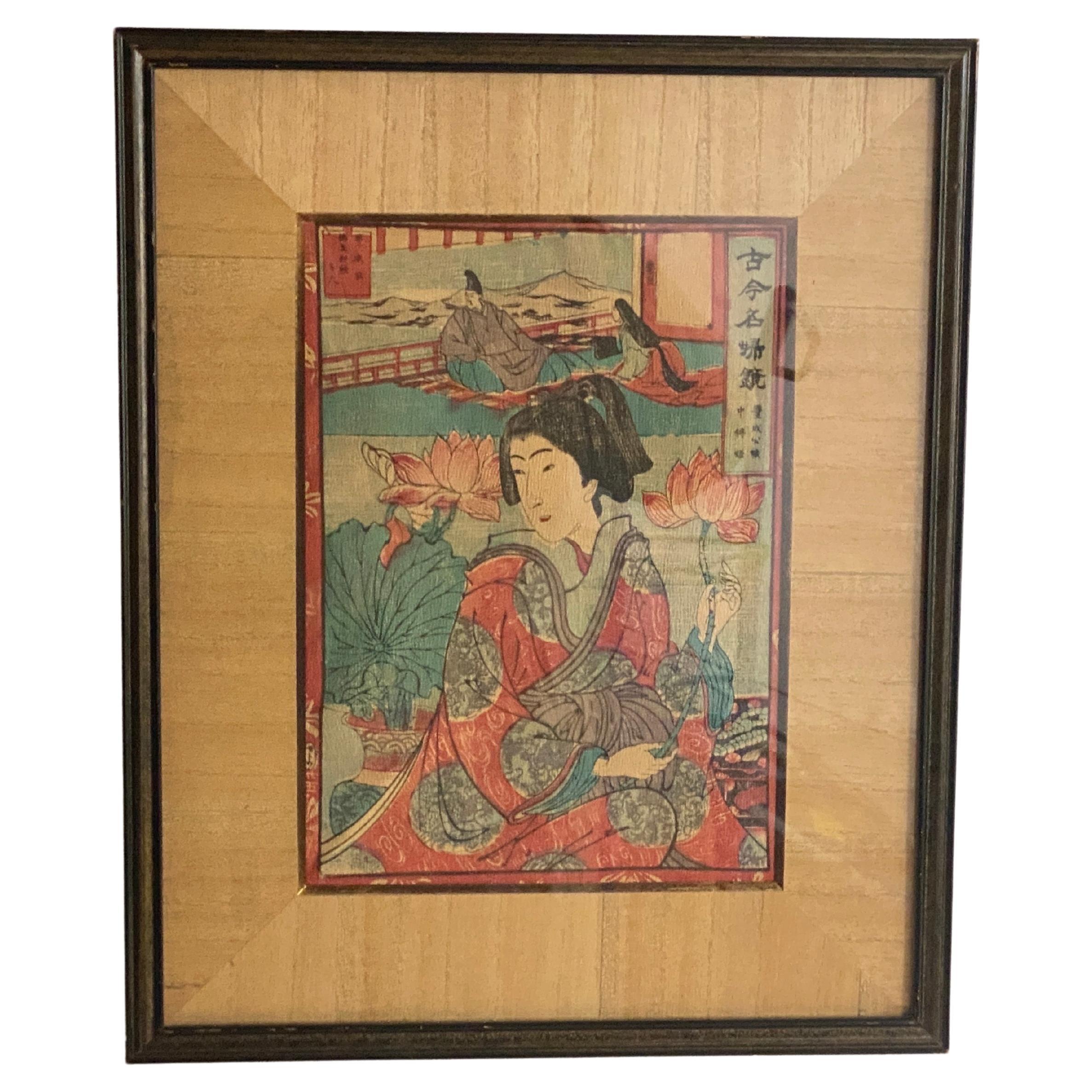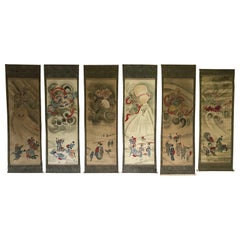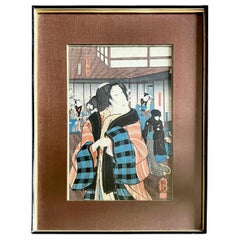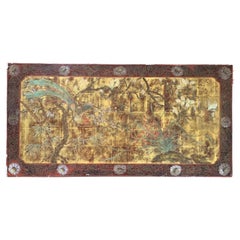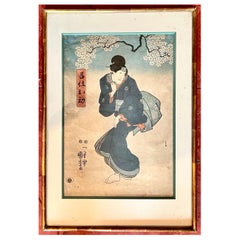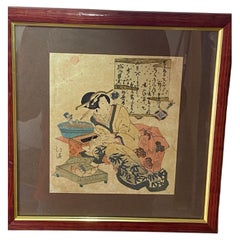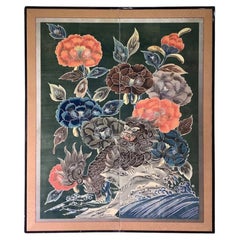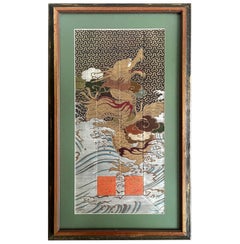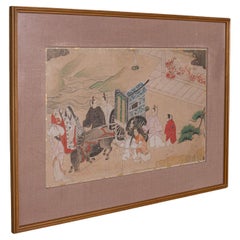Items Similar to Polychrome woodblock print - nishiki-e - late Edo/early Meiji period, circa 1850
Want more images or videos?
Request additional images or videos from the seller
1 of 7
Polychrome woodblock print - nishiki-e - late Edo/early Meiji period, circa 1850
$675.65
£506.01
€570
CA$947.09
A$1,043.47
CHF 540.16
MX$12,563.62
NOK 6,839.76
SEK 6,425.52
DKK 4,340.88
About the Item
Educational sheet illustrating a series of horses depicted in various positions and gaits—walk, trot, gallop, rearing, bucking, lying, etc. Each figure is accompanied by a Japanese caption indicating the action or gait. In its subject and vignette layout, the print is part of the tradition of popular and didactic plates: omocha-e (fun/educational prints), gafu/gufu (model sheets for drawing), and bajutsu (馬術, equestrian arts, samurai, dressage). The bold palette (blues, reds, blacks) and the energetic drawing of the saddled and caparisoned horses confirm this demonstrative character.
Printed on antique washi paper; irregular edges, wear and small losses (notably at the bottom right) consistent with a work/use sheet rather than a luxury print. A legible and decorative set, a testament to Japanese equestrian practices and popular imagery in the mid-19th century.
Frame: H 14,96 inch x W 9,44 inch
- Dimensions:Height: 23.23 in (59 cm)Width: 15.36 in (39 cm)Depth: 0.79 in (2 cm)
- Materials and Techniques:Paper,Engraved
- Place of Origin:
- Period:
- Date of Manufacture:Circa 1850
- Condition:
- Seller Location:Beuzevillette, FR
- Reference Number:1stDibs: LU2663327227142
About the Seller
4.9
Gold Seller
Premium sellers maintaining a 4.3+ rating and 24-hour response times
Established in 2010
1stDibs seller since 2017
303 sales on 1stDibs
Typical response time: <1 hour
- ShippingRetrieving quote...Shipping from: Nointot, France
- Return Policy
Authenticity Guarantee
In the unlikely event there’s an issue with an item’s authenticity, contact us within 1 year for a full refund. DetailsMoney-Back Guarantee
If your item is not as described, is damaged in transit, or does not arrive, contact us within 7 days for a full refund. Details24-Hour Cancellation
You have a 24-hour grace period in which to reconsider your purchase, with no questions asked.Vetted Professional Sellers
Our world-class sellers must adhere to strict standards for service and quality, maintaining the integrity of our listings.Price-Match Guarantee
If you find that a seller listed the same item for a lower price elsewhere, we’ll match it.Trusted Global Delivery
Our best-in-class carrier network provides specialized shipping options worldwide, including custom delivery.More From This Seller
View AllSet of 6 Large Kakemonos Japanese Mythology, 19th Century Japan circa 1800 Edo
Located in Beuzevillette, FR
Beautiful set of 6 large kakemonos from 19th century Japanese mythology.
Paper support with a canvas pasted on the paper
Wonderful set that is part of Japan's history and beliefs
When not hung, the Kakemonos are rolled up.
circa 1800 - Japan - Edo Period
A kakemono translates as "object to hang". In Japan this refers to a painting or calligraphy, most often done on silk or paper framed in a scroll that was intended to be hung on walls or in public lighting. This particular form, which allows them to be in a roll, dates back to the Tang dynasty in China (this would be related to the copying and preservation of ancient Buddhist texts). A Kami is a deity or spirit worshipped in the Shinto religion. A Yokai is a spirit, ghost, demon, or strange apparition from the creatures of Japanese folklore.
Each of these kakemonos represents a unique story:
- A kami, a Japanese deity, is shown painting a rainbow. Indeed, he performs the action with his right hand while his left hand holds a kind of basket with three pots of paint. This kami has a rather closed attitude. He is standing in a dark and tormented sky. Below this figure, 8 villagers are dressed in traditional Japanese clothes. Their faces are softened. They are not afraid of the elements made by the kami above their heads.
- A character with an unreal look is holding a kind of jar with his two hands, which he spills on human figures above. This being is floating in the air, probably a character from mythology, perhaps Susanoo. Underneath, villagers on umbrellas. They are trying to protect themselves as best they can from what is falling on them. One of them is carrying baskets with fish on her shoulders. A character in the background is thrown forward and falls.
- On this kakemono, the god Raijin, dressed in a white and blue outfit, strikes the sky with his two drum hammers to create lightning and its thunderous sound. Surrounded by Tomoe and a long red scarf, Raijin, enraged and with dishevelled hair, creates a dark and violent storm. The villagers seem frightened by this meteorological phenomenon. One of the villagers can be seen fainting in the arms of a man. This scene may seem chaotic, but Japanese legend tells us that once a field is struck by lightning, the harvest is good.
- On this kakemono, we see an unreal-looking figure holding a fan, as if he were sweeping away the bad weather, or simply producing gusts of wind. He is probably the kami of wind and air, Shina tsu-hiko. The figures below him seem surprised by so much wind. An umbrella flies away on the left, the women hold their hair and scarf, the clothes are caught in the power of the wind, there is even a woman on the ground on the bottom left.
- This Kakemono represents a short moment. This Raiju is a yokai (ghost spirit...
Category
Antique 19th Century Japanese Edo Paintings
Materials
Paper
Estampe japonaise en couleur 19eme - Utagawa Kuniyoshi
Located in Beuzevillette, FR
A very fine framed Japanese color woodblock print by Kuniyoshi, dated 1852, depicting Bandō Shūka I as a courtier Shiraito (白糸) of the Hashimotoya (橋本屋).
INSCRIPTIONS lower right:
S...
Category
Antique 19th Century Prints
Materials
Paper
A.Bouverat Chinese Inspired Lacquered Panel Hand-Painted 20th Century
By A. Bouverat
Located in Beuzevillette, FR
Very beautiful rare and large lacquer of Chinese inspiration. Representation of a green space with many plants such as cherry trees and magnolia. A bird crosses the lacquer with its ...
Category
20th Century French Chinoiserie Paintings
Materials
Lacquer
Japanese ukiyo-e woodblock print – Woman under Cherry Blossoms – signed Kunisada
Located in Beuzevillette, FR
A superb Japanese ukiyo-e woodblock print depicting an elegant young woman wearing a blue kimono, walking beneath cherry blossoms in spring. This poetic and refined scene perfectly i...
Category
Antique 19th Century Japanese Edo Paintings and Screens
Materials
Paper
Immortal He Xiangu Painting on Canvas, China, 19th Century Asian Art
Located in Beuzevillette, FR
Chinese painting depicting He Xiangu reproduced three times but with a different attribute: up a lotus flower, bottom left a fly hunt and bottom right again the lotus flower, each time surrounded by disciple the one praying right, the one on the left seems to bring him a bowl.
Pigments on linen or hemp,
19th century.
He Xiangu or Ho Hsien-ku, "Immortal Demoiselle He," is an immortal Taoist, a member of the group of Eight Immortals. She is represented holding in her hand a lotus symbolizing spiritual fulfillment, and sometimes also a sheng, a peach of immortality, a wooden ladle...
Category
Antique 19th Century Chinese Qing Paintings and Screens
Materials
Canvas
Asian Mandala Tanka circa 1900
Located in Beuzevillette, FR
Very beautiful tanka mandala of the 19th century painted on canvas . Buddha is in the center with the naga on his right arm, surrounded by others arranged like the rays of the sun. T...
Category
Antique 19th Century Asian Paintings and Screens
Materials
Canvas
You May Also Like
Original Japanese Woodblock Print by Totoya Hokkei 19th Century
By Totoya Hokkei
Located in Auribeau sur Siagne, FR
Rare, original Utagawa Hiroshige 19th century woodblock print. Beautiful Edo period print from the original publisher. Museum quality framed with con...
Category
Antique 19th Century Japanese Chinese Export Prints
Materials
Paper
$2,370 Sale Price
20% Off
Late Edo period Tsutsugaki 筒描 Auspicious Shishi Batik Screen
Located in Fukuoka, JP
Auspicious Shishi Batik Screen
Period: Late Edo
Size: 145x173 cm (57x68 inches)
SKU: PTA62
Step into the mythical world of late Edo Japan with our radiant batik screen depicting the...
Category
Antique 19th Century Japanese Edo Paintings and Screens
Materials
Cotton, Wood
Framed Japanese Woven Textile Panel with Dragon Meiji Period
Located in Atlanta, GA
A framed Japanese woven textile circa late 19th century of Meiji Period. Likely a fragment of a priest robe or kesa, the multi-paneled textile was finely woven with gold foiled threads that depicts a five-clawed dragon slithering in the clouds and water...
Category
Antique 19th Century Japanese Meiji Textiles
Materials
Silk, Wood
Antique Framed Woodblock Print, Japanese, After Heian, Art, Victorian, C.1900
Located in Hele, Devon, GB
This is an antique framed woodblock print. A Japanese, after Heian era art scene, dating to the late Victorian period, circa 1900.
The Heian period of ...
Category
Antique Late 19th Century Japanese Decorative Art
Materials
Pine
Antique Japanese Woodblock by Utagawa Toyokuni III (1786~1864), 三代歌川豊国 Ric.J006
Located in Norton, MA
A Japanese Woodblock A Young Woman in a Ruined House, print by Utagawa Toyokuni III (1786~1964), 三代歌川豊国.
Dated: Aratame seal, 1855
Publisher: Koshimura-ya Heisuke
ABOUT THE ARTIST
U...
Category
Antique Mid-19th Century Japanese Prints
Materials
Paper
Original Japanese Woodblock Print by Japanese Artist 19th Century
Located in Auribeau sur Siagne, FR
Rare, original 19th century woodblock print. Beautiful Edo period print from the original publisher. Quality framed with conservation glass in an black painted frame.
Red Blue Gree...
Category
Antique 19th Century Japanese Chinese Export Prints
Materials
Paper
$256 Sale Price
20% Off
